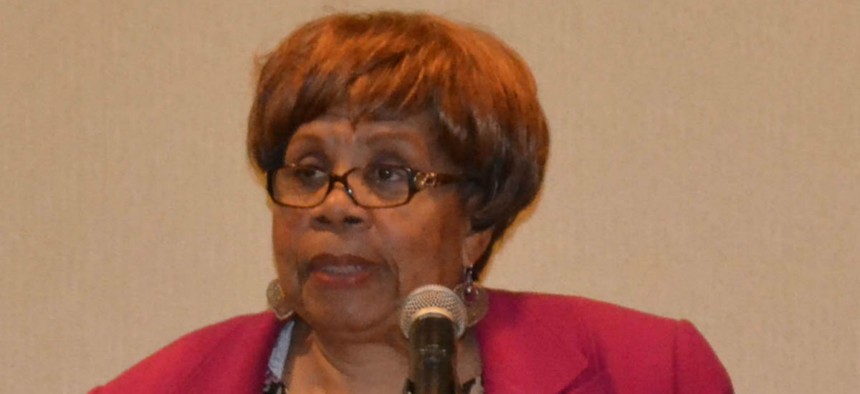
Acting Social Security Commissioner Carolyn Colvin Flickr user AFGE
Do Government's Foibles Turn off Millennials?
SSA chief and others describe how to hold the interest of young recruits.
Older employees “live to work,” but Millennials “work to live,” said acting Social Security Commissioner Carolyn Colvin at a panel discussion last week. “Young people are just not going to stay in the same positions, and we recognize that they have an outside life.”
That’s why the Social Security Administration has launched an array of programs addressing the four generations in its workforce, Colvin said at a May 3 symposium on “Changing Government” put on by the National Academy of Public Administration.
She spoke from the audience as the discussion turned to the nation’s 75.4 million people age 18-34—-the Millennials who last month overtook the vast Baby Boomer generation in sheer numbers. According to the Office of Personnel Management, that younger cohort in fiscal 2015 made up only 16.9 percent of the federal government’s full-time permanent workforce.
Millennials are more competitive, compare themselves with their peers, switch agencies more and use mentors, said Tim Bowden, a consultant with Management Concepts, which helped with the event.
SSA, which boasts an employee retention rate of 93 percent, seeks to engender loyalty with a career path program called SkillsConnect. It allows employees to spend 80 percent of their time in their main job and 20 percent learning new skills from managers in other units. Project opportunities are posted to a website and employees can submit applications to compete to participate for up to one year, an agency spokeswoman confirmed. The pilot program will expand agencywide this summer.
There’s also a type of suggestion box informally named “What action would you take or decision would you make if you were the commissioner?" Colvin said she has so far received 1,700 recommendations from employees. This is enough, she said, so that she no longer pays those who submit ideas, which doesn’t please the unions, she added, though she values the suggestions highly.
Like many agencies, SSA also encourages telecommuting, conducts regular town hall meetings (not easy with 60,000 employees in 1,400 offices), and holds regular brown-bag lunches and group telephone talks to engage employees.
Panelists from other agencies also warmed to the topic of how to keep Millennials in government.
Ret. Adm. Lewis W. Crenshaw Jr., who spent decades in the Navy and served as commander of Navy Region Europe, said, “There is a reluctance at agencies to embrace technology, which is a turnoff for Millennials. It’s upside down,” he added. “The chairman of the Joint Chiefs probably has one of the biggest bad-ass computers with 17 terabytes and the full Office suite, but only uses it for email.” Meanwhile, “the poor analyst has to beg for an extra megabyte.”
On an efficiency kick, his naval command in Europe took money from its travel budget to buy online collaborative tools. “But they don’t work due to security issues and a lack of bandwidth,” Crenshaw said. “It drives the kids nuts.”
Dan Tangherlini, former head of the General Services Administration, said the Millennials he worked with “see culture as more important than compensation. They want experience,” he said.
Photo: AFGE, via Flickr







